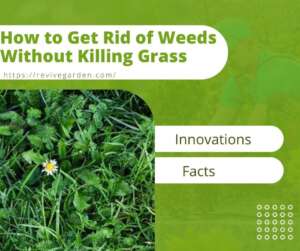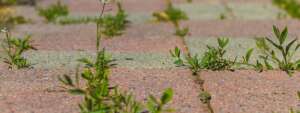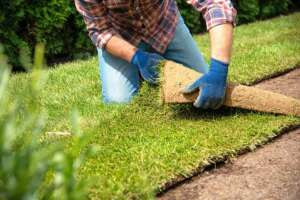Table of Contents
 Do you want to keep your lawn healthy and free of weeds but don’t want to kill the grass? You’re not alone. Many homeowners struggle to find a good balance between keeping their lawn healthy and weed-free without resorting to harsh chemicals. Here are some tips on how to get rid of weeds without damaging the grass. There are many ways to get rid of weeds without ruining the grass, and we’ll show you the most effective methods. Plus, we’ll give you a few tips on dealing with stubborn weeds that refuse to disappear no matter what you do. So read on, and learn how to get rid of weeds without killing grass.
Do you want to keep your lawn healthy and free of weeds but don’t want to kill the grass? You’re not alone. Many homeowners struggle to find a good balance between keeping their lawn healthy and weed-free without resorting to harsh chemicals. Here are some tips on how to get rid of weeds without damaging the grass. There are many ways to get rid of weeds without ruining the grass, and we’ll show you the most effective methods. Plus, we’ll give you a few tips on dealing with stubborn weeds that refuse to disappear no matter what you do. So read on, and learn how to get rid of weeds without killing grass.
How to Get Rid of Weeds Without Killing Grass – Facts
It’s a common problem: You take care of your lawn, but weeds continue to grow. You want to keep your grass healthy and green, but you also need an effective way of killing weeds. The good news is that you don’t have to choose between a weed-free lawn and a healthy one! There are many ways to clean your lawn from weeds without killing grass.
Easy Steps
If your lawn produces many weeds and it’s too late for an easy fix, then consider using chemicals such as Round-Up or other herbicides that do not harm grasses. Herbicides are designed for killing broadleaved plants (those with broad leaves) rather than grasses.
Reason for Weeds Growth
Weeds grow in your lawn for the same reason any plant grows — because it has what it needs (moisture, sunlight), and its root system has access to the nutrients it needs. When the conditions are right for a weed, they can quickly grow into large patches that overtake an entire area of your lawn within weeks.
Weeds Germinate

Weed seeds can be transported by wind or water from other parts of your yard or nearby yards. They can also come from seeds carried in mud on shoes or clothing when people walk through them or drive over them with their cars. Many weeds also reproduce by spreading their roots underground and above ground, so if one plant takes hold in one spot, it will extend its roots into neighbouring areas where no other plants are growing.
Care Your Grass
The best way to keep weeds from growing on your lawn is to take care of the grass. You will want to do this by mowing regularly, watering, and fertilizing.
Weeds Favourite Places
Weeds can grow in any soil or environment, but they are more likely to grow in high-traffic areas that don’t get enough water or nutrients. Weeds also love areas with a lot of shade and moisture around them (i.e., lawns).
Keep Clean Your Lawn From Fallen Leaves
You should keep your lawn clean by removing leaves as soon as they fall off trees so they don’t block sunlight needed for healthy grass growth during winter. Be sure not to let weeds grow along sidewalks or driveways because these places provide perfect conditions for weed growth since they receive lots of foot traffic daily!
Steps to Clear Weeds

Do anything to keep weeds from growing in the first place
Once you’ve removed the weeds from your lawn, it’s time to ensure they don’t come back. If areas of your lawn have been affected by weeds, try to keep them healthy and weed-free with basic maintenance practices.
- Mow regularly – Use a sharp blade, and mow your grass between 1/3 and 1/2 inch tall
- Water appropriately – Check with a watering can or hose to see if the soil is moist before you water, then water deeply until all the soil has been soaked through. If grass turns brown during droughts, stop watering it until rain arrives again.
- Fertilize appropriately – Once every three months during the peak growing season (spring and summer), fertilize your yard using an organic fertilizer such as fish emulsion mixed into a solution with water and spread evenly over the area where you’d like to grow new grass plants.
Get rid of weeds that are already there
To get rid of existing weeds, you will need to use one of these tools:
- A long-handled hoe or spade
- Chemical weed killer
- Weed torch (also known as a flame weeder)
- Weedwhacker (also known as a weed eater or weed trimmer) with attachments that are designed for this purpose
- Handheld manual string trimmer with extensions that are designed for this purpose
Chop down the top layer of weeds
Next, you’ll need to chop down the top layer of weeds. This can do with a shovel, a weed rake, a hoe, or a weed trimmer. Just make sure you don’t damage any grass while chopping down your weeds!
Dilute vinegar and pour it onto the weeds
Vinegar is a natural weed killer and will kill most weeds within 24 hours.
For this step, you’ll need:
- A bucket or other container to hold the vinegar mixture
- A mister bottle (you can buy one at your local hardware store or use a spray bottle)
To dilute your vinegar solution:
Fill the container with vinegar up to about 1 inch from the top, then fill it with water until it reaches 3/4 of an inch from the top of your mixture.
This ratio is about 1 part vinegar to 3 parts water, which should be enough for killing weeds without harming grass or other plants (the grade of vinegar you use isn’t super important).
Pour this diluted solution onto your weeds. Make sure you cover all areas where they have grown! If necessary, mix more liquid and pour it on as needed over time until they are completely dead and gone.
Citrus Oil

Citrus oil is another popular option for natural weed killers. The citrus plant contains a chemical called d-limonene, which has been shown to have anti-fungal and anti-bacterial properties. It also works as a herbicide, killing plants like crabgrass and dandelions by dissolving their cell walls.
To use citrus oil to eliminate weeds in your lawn, you’ll need:
- 1 gallon of warm water (about 110 degrees F)
- ½ teaspoon citric acid or lemon juice (or 2 tablespoons if using lemon juice)
- 10 drops of essential oils like lemongrass or peppermint
Conclusion
We hope this article has helped you and your grass. There are many ways to deal with weeds without killing your lawn, so it’s important to keep these tips in mind when you’re planning out your next landscaping project or even just wanting to have a nice yard. We like organic methods because they reduce the risk of harming other plants, animals or people who live nearby. They also tend not to cause long-term damage to the soil which makes them more sustainable than herbicides that degrade over time into harmful chemicals like DDT (dichlorodiphenyltrichloroethane).
That’s here. So, we feel this information is adequate for the survival of your grass weeds free. If you follow the tips, we ensure you may get helped.
